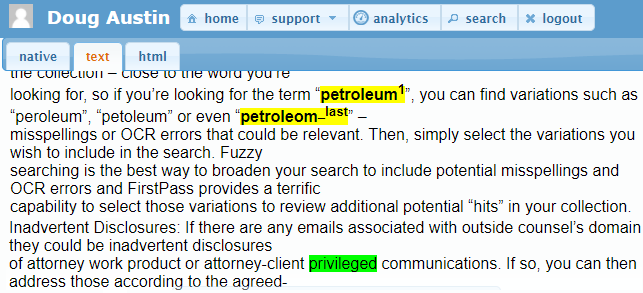Court Sides with Defendants in Subpoena of Police Department Records of Unsolved Murder: eDiscovery Case Law
This case combines civil and criminal concerns, so it’s a great case to lead off the new year!
In Farmers New World Life Ins. Co. v. Atchison, No. CIV-17-1254-D (W.D. Okla. Dec. 17, 2018), Oklahoma District Judge Timothy D. DiGiusti granted the “Children” defendants’ Motion to Compel against non-party City of Oklahoma City Police Department (“OCPD”) to comply with the Children’s subpoena of records related to the murder of their father in a civil case with the insurance company.
Case Background
In an interpleader action arising from the murder of the father of minor Defendants (“Children”), one of the other defendants was the named beneficiary on an insurance policy provided by the plaintiff, but was also the primary suspect in the murder of the Children defendants’ father. The plaintiff filed the action seeking interpleader relief on the basis of Oklahoma’s “slayer statute,” and the “Children” became aware of the action and the insurance policy in February 2018 when they were served with summons. The Children submitted a request to the OCPD, but OCPD denied the request. The “Children” then issued a subpoena to defendant City of Oklahoma City requesting records related to the murder.
The City of Oklahoma City objected to the subpoena on behalf of OCPD stating that the criminal investigation into the death was ongoing and that the release of the requested reports might interfere with the investigation (where no charges had been filed). In response, the “Children” filed a Motion to Compel seeking compliance with the subpoena or, in the alternative, an in-camera inspection of the investigative file. The City of Oklahoma City opposed the motion on privilege grounds, but indicated they would agree to an in camera inspection with counsel for the “Children” during the review but objected to the presence of counsel for the defendant suspected of murder; in turn, that defendant objected to an ex parte in-camera inspection or any production of discovery that is not likewise provided to her.
Judge’s Ruling
Judge DiGiusti cited United States v. Winner in stating “To assert the law enforcement evidentiary privilege, the responsible official in the department must lodge a formal claim of privilege, after actual personal consideration, specifying with particularity the information for which protection is sought, and explain why the information falls within the scope of the privilege.” Given that the “Children” asserted that OCPD failed to comply with these requirements, Judge DiGiusti said:
“The Court agrees with the Children. The only objections received on behalf of OCPD are an email from an individual of unidentified position in the Oklahoma City government and a letter from a municipal counselor…OCPD presents no formal claim from any responsible official within the department indicating “personal consideration” and “specifying with particularity the information for which protection is sought.” Instead, the City presents only the affidavit and search warrant along with a general objection that producing the requested information falls under the privilege because it will harm the ongoing investigation. Such a broad explanation does not comply with the requirements of Winner.”
Noting that the victim was “murdered nearly two years ago, no charges have been filed, and no arrest made” and that the affidavit informed the suspected defendant “of the theory of the case against her, the types of evidence in possession of OCPD at the time of the affidavit, as well as the evidence sought through the search warrant”, Judge DiGiusti found that “OCPD has failed to establish with particularity how production would harm the ongoing murder investigation.” Finding that “the Children have made a compelling argument that the investigative material is relevant and necessary to their case aimed at preventing Defendant Keisha Jones from recovering a life insurance policy on the basis of her alleged involvement in Mr. Atchison’s murder”, Judge DiGiusti ordered OCPD to produce “all materials responsive to the Children’s subpoena” to the chambers of the undersigned judge within thirty days.
So, what do you think? Should the judge have allowed those materials to be produced, even for an in camera review? Please let us know if any comments you might have or if you’d like to know more about a particular topic.

Case opinion link courtesy of eDiscovery Assistant.
Sponsor: This blog is sponsored by CloudNine, which is a data and legal discovery technology company with proven expertise in simplifying and automating the discovery of data for audits, investigations, and litigation. Used by legal and business customers worldwide including more than 50 of the top 250 Am Law firms and many of the world’s leading corporations, CloudNine’s eDiscovery automation software and services help customers gain insight and intelligence on electronic data.
Disclaimer: The views represented herein are exclusively the views of the author, and do not necessarily represent the views held by CloudNine. eDiscovery Daily is made available by CloudNine solely for educational purposes to provide general information about general eDiscovery principles and not to provide specific legal advice applicable to any particular circumstance. eDiscovery Daily should not be used as a substitute for competent legal advice from a lawyer you have retained and who has agreed to represent you.






